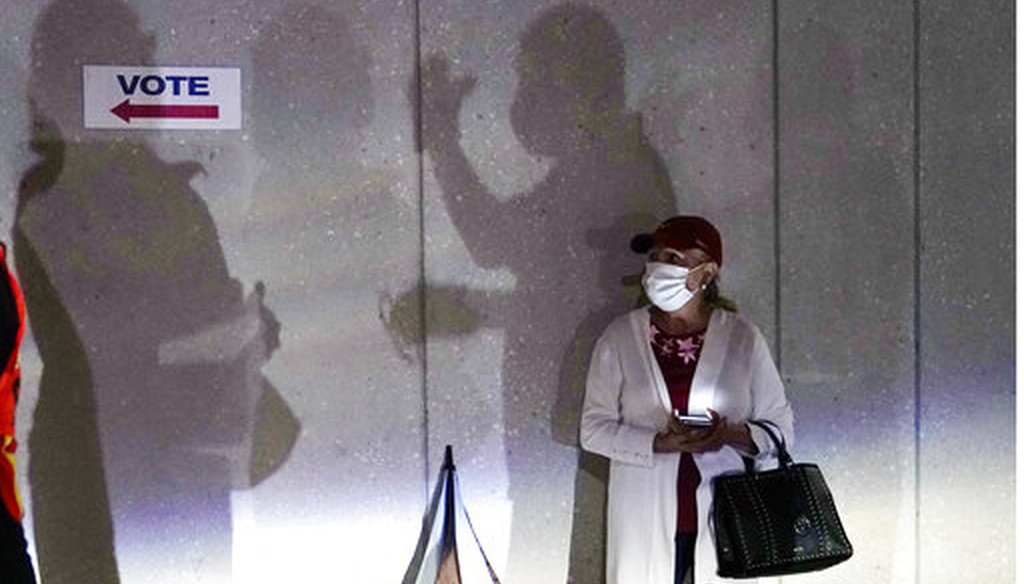Get PolitiFact in your inbox.

A woman waits to vote, Monday, Oct. 19, 2020, in Miami. Florida begins in-person early voting in much of the state Monday. With its 29 electoral votes, Florida is crucial to both candidates in order to win the White House. (AP)
If Your Time is short
-
U.S. intelligence officials announced that Iran was behind the spoofed email threats sent to U.S. voters in Florida and Alaska. They did not elaborate.
-
They also said that some voter registration information has been obtained by Iran, and separately by Russia. This information is easily found in public records.
-
FBI director Christopher Wray said voters should remain confident that their votes will count.
U.S. intelligence officials said they believe Iran sent threatening emails to Democratic voters two weeks before the election.
The emails were made to look like they came from the Proud Boys, a far-right, men-only group, and falsely told recipients that they would know if voters didn’t select President Donald Trump on their private ballots.
Director of National Intelligence John Ratcliffe said that Iran and Russia had obtained voter registration data "to influence public opinion relating to our elections." Neither Ratcliffe nor FBI director Christopher Wray identified the location of the affected voters, but election officials in Florida and Alaska confirmed that voters in their states received the threats.
The Oct. 21 press conference was held a day after news broke about the email messages, which said the writer possessed the voter’s address, email address and phone number. The email claims "we will know which candidate you voted for," which we rated Pants on Fire. While information on a Floridian’s voter registration, such as their party affiliation and name, is a public record, their actual ballot is private. In a general election, voters can select whichever candidate they like, regardless of their party affiliation, in secret.
Ratcliffe did not say how officials came to the conclusion that Iran was responsible, only that it was a voter intimidation tactic.
"We have confirmed that some voter registration information has been obtained by Iran, and separately by Russia," Ratcliffe said. "This data can be used by foreign actors to attempt to communicate false information to registered voters that they hope will cause confusion, sow chaos and undermine your confidence in American democracy."
Ratcliffe also said that Iran distributed a video that falsely "implies that individuals could cast fraudulent ballots, even from overseas."
Officials said Russia obtained some voter information, as they did in 2016. They did not elaborate or take questions after their eight-minute remarks.
Nothing in the comments by Wray or Ratcliffe suggested that foreign actors had changed anyone’s voter registration or actual votes cast. Voter registration data, including names and party affiliation, is a public record commonly used by campaigns and political parties to reach out to voters.
Nina Jankowicz, an expert on disinformation at the Woodrow Wilson International Center for Scholars, said most people don’t know that voter registration records are public and easily obtainable. "The integrity of people's vote and the secrecy of their ballots will not be affected by the fact that Iran and Russia have this data," she said.
Ratcliffe said the spoofed emails were designed to damage President Donald Trump, but it wasn’t clear how since the emails told voters to choose Trump. Sen. Chuck Schumer, D-N.Y., told MSNBC’s Rachel Maddow that in his intelligence briefing, officials did not convey Trump was the target.
"From the briefing, I had the strong impression it was much rather to undermine confidence in elections and not aimed at any particular figure but rather to undermine the very wellspring of our democracy elections," Schumer said.
American intelligence officials have expressed concern in recent months about not only Russia but also China and Iran interfering in the U.S. election. After the 2016 election, a bipartisan Senate report and former special counsel Robert Mueller’s investigation concluded that Russian operatives used a series of "active measures" to hack campaigns, spread disinformation and sow discord in an effort to sway the election in favor of Trump.
Jankowicz said while Ratcliffe did not offer more specifics about Russia’s latest activities, she believes the country continues to be "the superior and more sophisticated adversary in the information space."
"I'm also not necessarily sure how Iran's attempts at disinformation and voter suppression aimed at Democrats help President Trump," she said.
Mark Ard, a Florida elections spokesperson, said in a statement that the state’s voter registration database hasn’t been breached.
Whether someone cast a ballot is a public record. But the database "does not include any information that discloses how a voter voted in any contest. The secrecy of the ballot is maintained throughout the voting process."
RELATED: What we know about 2020 election interference: It’s not just Russia
Our Sources
C-SPAN, Briefing by FBI director Christopher Wray and Director of National Intelligence John Ratcliffe, Oct. 21, 2020
FBi, FBI Director Christopher Wray’s Remarks at Press Conference on Election Security, Oct. 21, 2020
Rev.com, FBI, DNI Press Conference Transcript: Russia & Iran Trying to Interfere in U.S. Election, Oct. 21, 2020
New York Times, Iran and Russia Seek to Influence Election in Final Days, U.S. Officials Warn, Oct. 21, 2020
New York Times, John Ratcliffe Pledged to Stay Apolitical. Then He Began Serving Trump’s Political Agenda. Oct. 19, 2020
Washington Post, DNI Ratcliffe said Iran aimed to hurt Trump with faked Proud Boy emails. Democrats are skeptical. Oct. 22, 2020
Maddow Blog, Tweet, Oct. 21, 2020
PolitiFact, What we know about 2020 election interference: It’s not just Russia, Sept. 25, 2020
PolitiFact, Email threat to Florida Democrats falsely says 'we will know which candidate you voted for' Oct. 21, 2020
Email interview, Mark Ard, Florida Division of Elections spokesperson, Oct. 21, 2020
Interview with Darren Linvill, associate professor and disinformation expert at Clemson University, Oct. 22, 2020
Interview with Nina Jankowicz, disinformation fellow at the Wilson Center, Oct 22, 2020












































